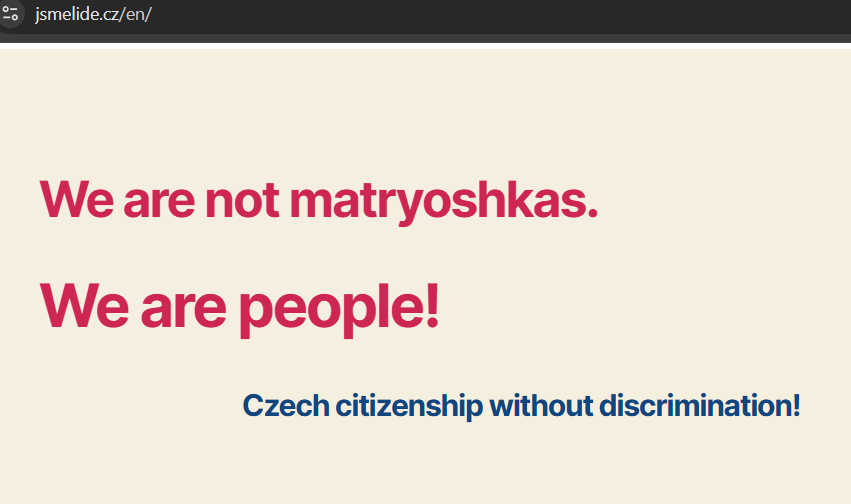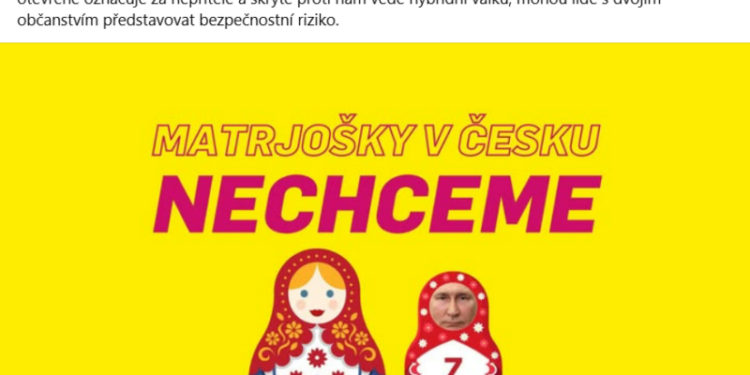Screenshot from Facebook page of the Minister of the Interior and Chairman of liberal political party STAN, Vít Rakušan “We don’t want Matryoshka in the Czech Republic.” Fair use.
The Czech government’s recent proposal to restrict citizenship applications for Russian nationals has sparked significant controversy. At the beginning of September 2024 Czech liberal party STAN (Mayors and Independents) proposed in a press release an amendment to the so-called Lex Ukraine 7 law to impose stricter conditions for Russian nationals seeking Czech citizenship.
This proposal comes at a politically charged time, as the Czech Republic prepares for its parliamentary elections in 2025. STAN is part of the government, run by a ruling coalition which, facing declining approval ratings, appears to be leveraging populist rhetoric to solidify its position. Furthermore, the presence of nearly 350,000 Ukrainian refugees in the country has heightened public sensitivity to issues of migration, citizenship, and security. Critics argue that while the Czech government has extended remarkable support to Ukrainian refugees, the proposed amendment reveals a double standard in its treatment of Russian nationals.
The Minister of the Interior and Chairman of STAN, Vít Rakušan, shared on social media a post symbolizing the proposal with an image of matryoshka dolls captioned: “We don’t want Matryoshka in the Czech Republic.” This statement drew parallels to a previous populist slogan by an Islamophobic group “We don’t want Islam in the Czech Republic,” which hit peak popularity a decade ago.
Under the proposed amendment, Russian citizens must renounce their Russian citizenship to be eligible for Czech citizenship. Martin Exner, STAN’s deputy chairman, justified it as a purported necessity for national security, stating:
We cannot allow that at a time when Russia is taking hostile actions not only against Ukraine, but also against us and other EU countries, its citizens can acquire Czech citizenship, and therefore all the rights related to it.
In another statement for Radio Prague International, he added that “the right to Czech citizenship is not a human right.”
While national security concerns are a valid justification for certain policies, critics argue this proposal raises serious questions about the Czech Republic’s commitment to democratic principles and its treatment of minorities. Combining the voices of affected individuals with insights from commentators, the law’s implications extend beyond security, concerns revealing troubling failures in Czech liberalism and the opportunistic nature of its current political establishment.
Voices from the Russian community
The amendment has left many the approximately 40,000 Russian residents of the Czech Republic feeling alienated and betrayed. These are not anonymous faces but well-integrated members of society who have built lives, families, and careers in the country.
Some members of the Russian community in Czech Republic are exiles who escaped Russia because they disagree with the Putin regime.
The activist group Jsme Lidé (We Are People) has created a website and organized petitions against such an amendment, stating that “We are not matryoshkas. We are people.” They have also held peaceful demonstrations and public events, spoken up for the cause, raised charities, and communicated with lawyers, legislators, and journalists.

Screenshot from webpage Jsmelide.cz. Fair use.
Global Voices interviewed some activists raising awareness of the dangers of such an amendment’s human cost, revealing the fear, uncertainty, and resentment it has sparked within the community.
Daria, an accountant who has lived in Prague for 10 years, highlights the amendment’s impracticality and its moral implications, feeling herself being treated by politicians as disposable:
I love it here. This is my home. I work, pay taxes, and have built my life here. Mr. Exner says that “ordinary Russians don’t need to be afraid of anything, they can perfectly fine live with a permanent residence permit in the Czech Republic,” however, he then mentions that in the case of conflict escalation with Russia, Russian citizens may and would be send out back to Russia. To the country I have no literal ties with. You cannot do the same thing with a Czech citizen. Mr. Exner, do you still think there is nothing to be afraid of? Do not answer, please, I already know what you are about to say.
Christina, a 28-year-old professional, working in an international company echoes similar concerns. “The amendment threatens my ability to connect with my family in Russia and my ability to live in the country I call home.” For her, Russian citizenship is her tie to her childhood, and her home, but “Czechia has become my home too.” She points out that there is no guarantee that she won’t be forced to leave Czech territory, abandoning her husband and child.
A 26-year-old doctor Taisiia Fedorkova, who graduated from Charles University and works now at Mulacova Nemocnice at the general medicine department and who is married to a Czech citizen, points out the amendment’s divisive consequences, feeling that it paints all people from Russia as enemies. She says that, aside from making her insecure about her future and not having the same citizenship as her children, her husband’s family does not understand the need for it.
Andrey, 42-year-old analytical professional with a PhD from the UK, who relocated to the EU via the Blue Card program and works in a leading manufacturing company in the Czech Republic, fears the amendment signals a dangerous legislative trend for other national minorities living in the Czech Republic as well.
Populism and the failure of Czech liberalism?
The amendment has drawn sharp criticism from commentators and analysts; many view it as emblematic of a broader failure within the Czech political establishment.
Journalist Ondřej Soukup argued that the amendment does more harm than good by alienating those who oppose the current Russian regime. He noted that the law plays directly into Russian propaganda, which seeks to portray the West as hostile toward ordinary Russians.
A commentary by Robert Havlíček, research fellow at the Association for International Issues (AMO) highlights the Czech government’s failure to uphold its liberal ideals, citing that even the Czech Ombudsman office criticized it as dangerous. He emphasized that the proposal undermines the Czech Republic’s reputation as a defender of human rights and democracy.
Even within the Czech political landscape, the move has been criticized for its shortsightedness. “Instead of addressing security threats through robust intelligence and targeted measures, the government has opted for a blanket policy that discriminates against an entire group of people,” a Radio Prague International commentary noted.
A turn towards far-right rhetoric
The amendment also reflects a surprising shift in the Czech political establishment toward far-right rhetoric. While the country has long been seen as a bastion of liberal democracy in Central Europe, this proposal suggests a departure from those values.
Yet critics argue this move is less about security and more about securing votes. As Daria put it:
This isn’t about protecting the country — it’s the usual political populism. [The ruling party] is trying to win votes with such a cheap trick, understanding that it will lose the next elections.
Just in case Mr. Exner has never heard of it, when applying for citizenship, the candidate is checked up and down by the Czech secret services.
Exner’s remarks that “ordinary Russians have nothing to fear” contrast starkly with the realities faced by Russian residents who fear deportation or losing their homes. Christina, who had been helping some of them voice their concerns through translation, explains that they have already faced hostility, with some receiving threatening messages on social media.
Besides its discriminatory approach, the proposed amendment is in many cases impractical. To renounce Russian citizenship, individuals are required to travel to Russia and complete the process in person — an impossible or dangerous task for many. Numerous Russians in the Czech Republic are vocal anti-Putin activists, journalists — such as Irina Dolinina, Farida Kurbangaleeva, and Svetlana Prokopyeva — and dissidents who have sought refuge in this country due to fear of persecution. This requirement effectively alienates those who actively defend democratic values and participate in Czech civil society.
The proposed amendment to restrict citizenship for Russian nationals represents a critical test of the Czech Republic’s democratic values. Will the country uphold its liberal principles of inclusion and fairness, or will it succumb to the pressures of populism and fear?
Source link : http://www.bing.com/news/apiclick.aspx?ref=FexRss&aid=&tid=674ebaa39bf84cffa3b347b52a8704cd&url=https%3A%2F%2Fglobalvoices.org%2F2024%2F12%2F03%2Fthe-czech-republics-lex-russi-a-proactive-law-or-a-liberal-failure%2F&c=7661179251708185548&mkt=de-de
Author :
Publish date : 2024-12-02 23:41:00
Copyright for syndicated content belongs to the linked Source.


